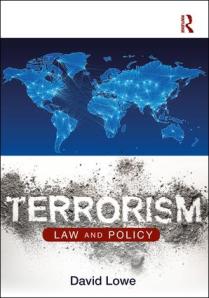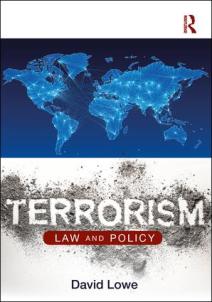Following a lengthy trial in the UK, on the 21st June 2019 John Letts and Sally Lane were convicted for the terrorism funding offence of making funding arrangements (section 17 Terrorism Act 2000). This conviction received widespread media coverage in the UK. The main reason for this is both are parents of a 23 year old male, Jack Letts, who went to Syria to join the terrorist organisation, Islamic State (IS). Both received a 15 months custodial sentence, suspended for 2 years. The couple were tried on three counts of making funding arrangements, but were only convicted on one count, with the jury finding them not guilty on the second count and unable to reach a verdict on the third count. The value of the count they were convicted for was £223. As stated, the case received widespread UK media coverage and I gave a number of interviews to provide expert commentary to the BBC and independent broadcasters. One may wonder why this case received such media attention. This blog post will address this and assess both the offence of making funding arrangements and the sentencing guidelines provided to the judicary for offences related to terrorism funding.
John Letts and Sally Lane are a typical decent middle class couple who have lived what many would perceive as a normal life. Both work, had a family and have been a law abiding couple having no previous convictions. Their son, Jack Letts, converted to Islam when he was 16 years old and when he was 17 years old he went to study in the Middle East, which his parents funded. Shortly after Jack’s arrival in the Middle East his parents did not hear from him and evidence emerged that he was associating with IS extremists, something that Jack Letts confirmed to his parents when he told them he had joined other IS recruits in Raqqa, the capital of IS’ self-proclaimed caliphate. In essence these events became newsworthy because Jack Letts came from a white middle class family, converted to Islam at a young age, albeit with his parents’ support, and decided to join IS, a group that is known to be an extremist Islamist group with a vile, warped and violent ideology, hence why some of the printed media dubbed Letts as ‘Jihadi Jack’.
IS have not solely killed Christians, citizens from western states and homosexuals, IS have killed more Muslims that any other terrorist group and had a pogrom against Yazidis (whose religion is a cross between Christianity and Islam) who IS saw as devil worshippers. In one interview I gave for the BBC, I was part of discussion with a close friend of Letts and Lane during which he claimed there was no evidence of Jack Letts fighting with IS and that due to Assad’s regime in Syria bombing Aleppo, he joined IS for humanitarian reasons. Knowing what we do about IS, I suggest there is a degree of naivety regarding this claim. As I said in my interviews on this point, if Jack Letts wanted to carry out humanitarian work he should have joined the official groups. This had its danger as we saw with Alan Henning from the UK who was with official aid agencies when he was captured by IS and later beheaded by IS’ Emwazi (also from the UK and nicknamed ‘Jihadi John’).
Regarding the facts in Letts and Lane’s trial a great deal of sympathy has been shown for the couple. I think this is reflected in the verdicts the jury delivered and the sentence passed by the judge at their trial. I know being a parent myself, regardless of their age, they are still your children and as parents you still support and help them.
The offence they were tried for is funding arrangements under section 17 Terrorism Act 2000 that states it is an offence to:
‘…enter into or become concerned in the arrangement as a result of which money or other property is made available to another or he knows or has reasonable cause to suspect that it will or may be used for the purposes of terrorism’.
The offence is a serious one carrying a maximum of 14 years imprisonment.
As stated, the jury found Letts and Lane not guilty of section 17 in relation to attempting to send £1,000 to Jack Letts in December 2015 and unable to return a verdict regarding the attempt by Lane to send £500 to him in January 2016. The couple were sending Jack Letts money under the belief that it may help him survive, even escape from Raqqa and IS. Jack Letts told his parents that any money they sent him would not go on ‘jihad’, advising them if they sent the money to come up with a cover story. In September 2015 the couple did send £223 to Jack Letts’ contact in London.
Although they received conflicting messages from Jack Letts, some regarding the West dying in IS rage for its actions, other messages pleaded for help as he stated he was doubting IS’ ideology and beliefs and that he wanted to return home to the UK. In informing the police of this, the police, two independent experts, an academic specialising in this area and a professional de-radicaliser advised Letts and Lane not to send any money to Jack Letts. This may due to IS not allowing its members to own personal property and any money received by its members, IS would not allow them to keep, seeing it as property of IS. Ignoring this advice they tried to do so. Although one junior liaison police officer did suggest they send Jack money if it would help his escape, this was ill advised advice and a mistake.
Taking all the facts together, it appears the jury did find sufficient evidence to show beyond reasonable doubt that Letts and Lane were guilty of the first count regarding the sending the £223, but not the other counts. In passing sentence, the trial judge did say of Letts and Lane that they were, ‘…two perfectly decent people … in custody because of the love of their child’. This leads to the sentencing guidelines for financing terrorism trial judges have to follow. In March 2018 new sentencing guidelines on terrorism offences were published by the Sentencing Council, where the Council Chairman said that terrorist offences are among the most serious that come before the courts, adding:
‘As well as the threat to people’s lives, terrorist activity threatens the way society operates.’
The guidelines have a number of steps a trial judge must consider before reaching their decision. These includes assessing the culpability and harm associated with the facts of the case. It appears in Letts and Lane’s case, under culpability they performed a limited function under direction and under harm, the couple’s actions would only make a minor contribution for furthering terrorism. Another step judges take is assessing the aggravating and mitigating factors. Examining the aggravating factors related to Letts and Lane the only factor pertinent is their failure to respond to warnings. In mitigation, clearly the couple’s previous good character and not having previous convictions allowed the trial judge to pass a suspended sentence.
In conclusion, both Letts and Lane appear to have received sympathy for their plight by both the jury and the trial judge, as well as wider society. However, while some may see even the convictions as harsh, from the facts of the case Letts and Lane received advice from experts and practitioners not to send money to Jack Letts. Although the amount is small that led to the conviction, an acquittal would send a precedence for others not so ‘innocent’ to use in order to evade conviction for a serious offence. The circumstances Letts and Lane faced are difficult for any parent, but taking an objective view, as this case shows, sometimes tough love is needed.

In relation to IS and the UK offences under funding terrorism, you can find more detail in my book ‘Terrorism: Law and Policy’



